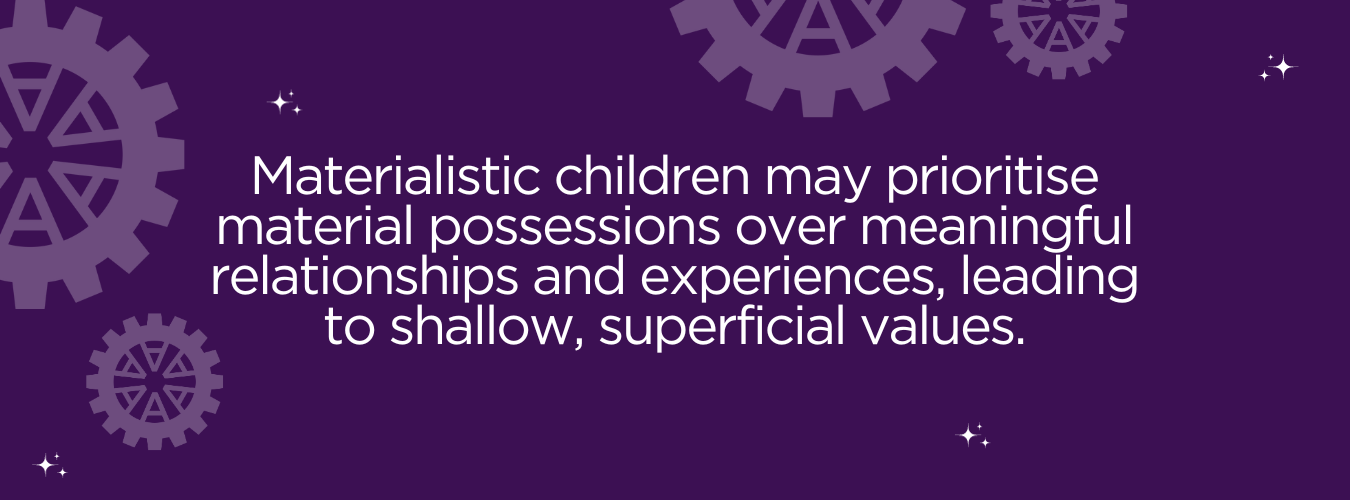Materialism in Children

In our fast-paced world, materialism has become deeply ingrained in our lives, affecting both children and families. The pervasive influence of consumerism and material culture touches every aspect of our society.
Understanding the significant impact of materialism on children and families is crucial for parents, educators, and society as a whole. Materialism becomes worrisome in children when it takes precedence over essential values, often leading to low self-esteem. This imbalance can trap children in a cycle of materialistic pursuits, where owning desirable items becomes a means to seek validation and self-worth.
In this blog post, we explore the complex phenomenon of materialism in children, uncovering its origins, its consequences, and most importantly, strategies to counteract materialistic tendencies.
Is your child struggling to keep up with schoolwork? Are they falling behind? Are they bored in class? Or are you looking for extension work for your child? Check out our eBook to learn more about how we help your child improve academically and build confidence through our in-centre after-school tuition.
Understanding Materialism in Children
Materialism in children signifies an intense desire for material goods and an obsession with consumer culture. This inclination frequently stems from various influences, such as advertising, peer pressure, and parental guidance.
In a world flooded with advertisements for the newest gadgets, fashion trends, and toys, it's not surprising that even five-year-olds can develop a materialistic mindset.
Materialism is a mentality that highly values money and possessions.
The threshold for what constitutes "a lot" of material things is subjective and varies across families and cultures, influenced by their beliefs and family values.

Why Do Some Children Become Materialistic?
Psychologists have observed that materialism starts to manifest in children around the ages of eight or nine. As they mature, self-awareness develops, leading to comparisons with others and potential struggles with self-esteem.
In late adolescence, most individuals become more secure in their identities, resulting in a natural decrease in materialistic tendencies.
If a young child's surroundings consistently depict money and possessions as the ultimate sources of happiness and reward, they are more likely to pursue materialism to enhance their self-esteem.
Much like other learned behaviours, children's attitudes are significantly influenced by their parents, the impact of advertising messages they are exposed to, and the values upheld by their friends, family, and peers.
The Effects of Materialism on Children
- Superficial Values: Materialistic children prioritise material possessions over meaningful relationships and experiences, nurturing shallow and superficial values.
- Reduced Self-esteem: The constant desire for more possessions can lead to a cycle of low self-esteem, as children might tie their self-worth to their belongings.
- Lack of Empathy: Materialistic tendencies can impede the development of empathy and compassion, as the focus remains on personal desires rather than the needs of others.
- Environmental Impact: Materialism drives overconsumption, contributing to environmental issues like pollution and resource depletion. These problems will significantly impact the future world of today's children.

How to Tell
Parents worried about managing their child's materialistic tendencies have noticed signs like:
- Consistently expecting money or toys for completing everyday tasks.
- Throwing tantrums when denied the latest trendy gadgets, comparing themselves to what other parents provide for their kids.
- Reluctance to let go of old toys untouched for years.
- Frequently complaining of boredom or lack of playthings, even with numerous toys and activities accessible.
- Swiftly losing interest in items they considered essential just a week ago.
How to Reduce a Child’s Materialism
A New York Times article highlighted a study involving 71 families with materialistic children. Half of the participants attended eight-week sessions designed to decrease their materialistic tendencies.
In comparison to the control group, these children showed a notable reduction in their materialism scores and an enhancement in their self-esteem.
Recommendations for Parents
Allocate a regular allowance to your children, dividing it into three categories: saving, spending, and giving. Engage in discussions with them about the reasoning behind their financial choices.
Be open about your family's income and expenses, helping your kids understand how money is managed. Teach them to differentiate between essential needs and wants, emphasising priorities like family experiences over material possessions such as luxury cars.
Address the influence of advertising and peer pressure, emphasising how these factors can influence desires. Identify and discuss real-life examples together as they arise.
Encourage your children to find a role model who demonstrates a healthy balance between desires, spending, and needs. Maintain these open conversations as a family throughout their pre-teen and teenage years.

Nurturing Essential Values in Children
- Foster Gratitude: Cultivate a sense of gratitude in children by engaging in daily conversations about the things they are thankful for. This practice promotes contentment, reducing their constant desire for more.
- Emphasise Experiences: Shift the focus from material gifts to meaningful experiences. Engage in activities that foster learning, creativity, and bonding, highlighting the value of shared moments over material possessions.
- Lead by Example: Children often mimic adult behaviour. Demonstrate mindful consumption and emphasise non-materialistic values such as kindness, generosity, and integrity.
- Monitor Screen Time: Excessive exposure to advertisements and social media can fuel materialistic tendencies. Set limits on screen time to lessen the influence of consumer culture on children's minds.
- Teach Financial Literacy: Help children grasp the value of money, emphasising the importance of saving and budgeting. Teaching responsible financial habits instils a sense of accountability, curbing impulsive spending.
- Encourage Philanthropy: Involve children in charitable activities, showcasing the joy of helping others. Acts of kindness nurture empathy, counteracting materialism's self-centred aspects.
- Promote Critical Thinking: Teach children to analyse advertisements and media critically. Enable them to recognise persuasive techniques, empowering them to make informed choices instead of succumbing to impulsive buying.
- Boost Self-Confidence: Assist children in building self-assurance based on their talents and qualities rather than material possessions. Encourage their hobbies, emphasising personal growth and achievements beyond material measures. Nurturing their passions develops a strong sense of self-worth, diminishing the appeal of materialism.

Experts advocate for reducing a child's exposure to materialism and bolstering their self-esteem by prioritising emotional needs over material desires. This involves refraining from exclusively rewarding or expressing love through material gifts and avoiding the use of material possessions as punishments, such as confiscating gadgets or toys.
Regarding a child's allowance, it's wise to teach them early on that a portion of their spending money, even starting at age two, should cover necessities like bus fare and lunch. As they grow older, the allowance can gradually include expenses such as clothing, school supplies, new toys, and entertainment.
Initially, cash payments are suitable, but as they mature, setting up an online bank account linked to yours can facilitate automatic transfers. This approach enables them to manage their finances online and provides the option of an EFTPOS or debit card for independent spending.
Combating materialism in children necessitates collaborative efforts from parents, educators, and society. By promoting values like gratitude, empathy, and responsible consumption, we can assist children in navigating the materialistic world while nurturing their character and overall well-being.
Through these combined efforts, we can empower the next generation to embrace a more balanced and fulfilling approach to life, emphasising genuine connections and contentment within the family and society.
At NumberWorks’nWords, we understand the importance of nurturing not only academic success but also the overall well-being of your child. If you're looking to support your child's holistic development, book a free assessment or find a centre near you today. Our tailored programmes not only enhance your child's maths and English abilities but also instil crucial life skills, helping them succeed both inside and outside the classroom. Join us in shaping a brighter future for your child!




